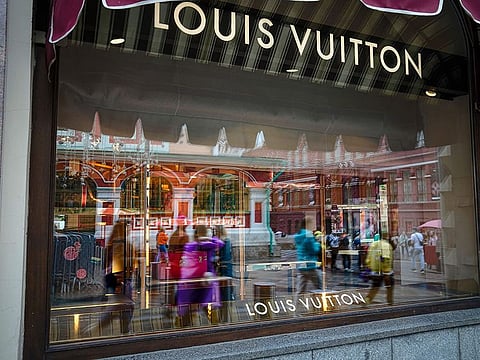LVMH breaks into world top 10 as market value nears $500 billion
Robust sales make founder Bernard Arnault world’s richest person with $198b fortune

LVMH, Europe’s largest company by market value, has now made it to the world’s top 10.
A first-quarter sales beat sparked a 5 per cent increase in the share price on Thursday, giving the luxury powerhouse a 29 per cent rally for the year. That, along with a gain in the euro against the dollar, lifted LVMH’s market capitalisation to $486 billion, briefly ranking it as the world’s 10th-biggest company. Should it reach $500 billion, it would become the first European company to achieve that milestone.
“This illustrates the rise of wealthy people across the world, of a polarised society,” said Gilles Guibout, head of European equity strategies at AXA Investment Managers. “The luxury sector is therefore experiencing strong growth.”
For a growing crowd of investors, LVMH and its French luxury rivals are to the European stock market what Big Tech has been to the US: Dominant businesses whose growth holds up even as the economy waxes and wanes. Shares of LVMH and Hermes International have on average returned more than 20 per cent annually the past decade and Kering has returned 16 per cent. The Stoxx Europe 600 Index lags far behind at 8.3 per cent annually.
French pension protesters briefly storm LVMH building in Paris
Protesters briefly stormed the Paris headquarters of LVMH on Thursday ahead of a labour union-led march against Emmanuel Macron's pension reform, setting off flares in the building on the chic Avenue Montaigne. Opponents of the president's plan to raise the minimum retirement age to 64 from 62 are increasingly targeting symbols of capitalism and business in France after the organized protests in recent weeks had little impact on the government's plans. On the morning of the previous day of strikes, small groups entered buildings housing the offices of BlackRock Inc. and Natixis SA. "Apparently our government is struggling to finance our social security and pension system, so money needs to be found where it is, which is in billions in companies like LVMH," Fabien Villedieu from the Sud-Rail unions said on BFM TV after leaving the luxury company's building. Macron's government says raising the pension age is vital to boost employment rates and halt the build-up of deficits in the massive public retirement system as the population ages. Unions say changing the age thresholds to claim a full pension will disproportionately penalise the least well-off and that there are other options to balance the system, including higher taxes on business and the wealthy.
“We have always invested in tech and in luxury, but the advantage of luxury on tech is that, while there are risks, disruption and obsolescence are lower,” said Guibout.
The robust sales that have lifted LVMH’s share price also have bolstered the wealth of its founder, Bernard Arnault. He’s the world’s richest person, with a $198 billion fortune, according to the Bloomberg Billionaires Index.
The catalyst for this year’s luxury gains, as in many recent years, is China. Coming out of the world’s strictest lockdowns, Chinese shoppers are splurging on luxury handbags and jewelry. LVMH’s soaring sales shows that demand for highly priced goods remains unabated even as a global economic slowdown looms.
The rally in luxury shares has cemented Paris’s standing as Europe’s biggest stock market, eclipsing London. The benchmark CAC 40 Index is on a record-setting spree, with gains of more than 15 per cent this year, outpacing other major markets.
The recent gains have taken LVMH’s valuation to 26 times forward earnings, twice that of the CAC 40. That doesn’t bother Nicolas Domont, a fund manager at Optigestion in Paris.
“It has become a must-have stock,” said Domont. “If it continues to deliver, I don’t have any problem paying the premium.”
Skeptics say the durability of luxury sales has yet to be tested in recent years by a long economic downturn. In a recession, all but the wealthiest of shoppers are likely to curb their spending, they say.
“I have been dead wrong advising clients to stay away from luxury but I am convinced (and stubborn) that something has to give in and that the risk-reward is still unfavorable,” Jie Zhang, an analyst at Alphavalue SAS in Paris, wrote in a note to clients on Thursday. “I still don’t buy the idea that luxury is immune to consumption.”
Sign up for the Daily Briefing
Get the latest news and updates straight to your inbox



